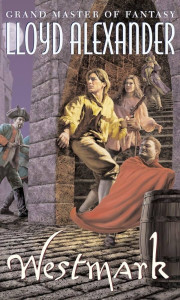 Theo is a young apprentice to a printer, an orphan who has been looked after by his community and his master, Anton. Business has been down lately because the Chief Minister Cabbarus has required official approval for every publication, with predictable results. After he accepts the job of printing a tract for a traveling count, err, con artist, Theo becomes a fugitive, and has a series of adventures that cause him to question his motives, his beliefs, and his loyalties to others — and to himself.
Theo is a young apprentice to a printer, an orphan who has been looked after by his community and his master, Anton. Business has been down lately because the Chief Minister Cabbarus has required official approval for every publication, with predictable results. After he accepts the job of printing a tract for a traveling count, err, con artist, Theo becomes a fugitive, and has a series of adventures that cause him to question his motives, his beliefs, and his loyalties to others — and to himself.
He meets a series of characters, including Count La Bombas, some political activists, a clever street girl name Mickle, and even the king’s physician‚ also a fugitive from the law. Will Theo be able to remain true to his beliefs and his growing affection for Mickle? Or will life on the road change him as he struggles to survive, make friends, and make sense of the world?
As usual, Alexander has created spunky, engaging characters, and put them in situations that confuse them, test them, and ultimately enable them to make choices for good or ill.
Re-released in 2002, Westmark is the first in a trilogy set in a world that bears a striking resemblance to Renaissance Europe. Science is present, but somehow resembles trickery, or magic. Exotic places are known to exist, but only shady characters like la Bombas seem to have traveled there. The aristocracy and the common folk seem set on a collision course, while bureaucrats step into the vacuum created by a weak monarchy.
Although adults who read fantasy may find both the plot and the setting somewhat predictable, they should still enjoy the characters, particularly the two protagonists, Theo and Mickle. Young readers who like fantasy should enjoy all of these elements. Alexander does a great job with both female characters and with the confusion that adolescent boys and girls engender in each other‚ a situation that rarely resolves itself in adulthood!
Westmark should appeal to primary school readers, and contains few really frightening scenes that would be inappropriate for younger readers. It should be acceptable to parents who want to avoid violence, although it contains one scene that involves some political guerrillas‚ a scene that questions how far Theo may be willing to go to rescue his friends.
I like the fact that Alexander introduces political discourse in a way that should be very accessible to this audience, and prepare them for more advanced literature, as well as more serious philosophy. As an adult, I heard echoes of Rousseau, and had a premonition of the French Revolution during the scenes where Theo meets the mysterious and magnetic Florian.
Florian’s magnetism and his relationship with his followers raise interesting questions about the appeal and perils of a strong leader, and somehow translates the allure of political movements into situations that a primary school student can understand. This book also deals well with the development of personal codes of ethics, and the way that life experience tests and helps a young person refine those codes. Theo’s difficulties and questions about La Bombas — a likable rogue who both cheats and amuses — are a wonderful exploration of the mixture of good and evil in all of us.
They also raise questions about the entertainment industry, and the responsibility we all have to avoid being cheated, to recognize when our hopes in something too good to be true are likely to lead us astray. The novel even introduces the controversial issue of capital punishment.
In summary, this book is long overdue for a fresh printing, because it uses engaging characters and a reasonable plot to introduce a number of complicated issues — issues that are bound to come up around most dinner tables where children and parents discuss their own journeys and try to make sense of world events. It would be much easier to discuss political fanaticism if Theo’s rather gentle experiences with the underground political activist Florian could be used as a jumping off point.
Westmark is not as dark and mystical as Alexander’s wonderful Chronicles of Prydain series, nor is the plot as complicated. But it shares many hallmark elements present in that series and his other work, such as the delightful Akkadians, in that the characters are memorable and likable; both female and male characters display sensitivity and a certain toughness, yet they remain decidedly masculine and feminine.
Westmark comes highly recommended from this reviewer. If your child has not been drawn to it on her own, this would be an excellent gift because it is both great fun, and, like most of Alexander’s work, lays the groundwork for a more “serious” treatment of some of life’s most difficult and perplexing issues.
(Dell, 1981; Firebird, 2002)
